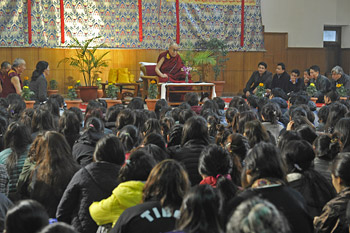
His Holiness the Dalai Lama speaking to students and staff living at the Tibetan Youth Hostel in New Delhi, India on January 25, 2015. Photo/Tenzin Jamphel/OHHDL
His Holiness the Dalai Lama Speaks to Tibetan Students in Delhi
New Delhi, India, January 25, 2015 – Today, at 9 o’clock in the morning His Holiness the Dalai Lama gave a short talk to about 300 students and staff residing at the Tibetan Youth Hostel in Rohini, Delhi. He was introduced by Mrs Tsering Dolma, Director of the Tibetan Youth Hostel, who first offered His Holiness a traditional white scarf.
His Holiness began by saying, “Wherever I go, I always emphasise that myself and the audience are the same in being human. If I present myself as His Holiness the Dalai Lama, it distances me from you as there is only one Dalai Lama in the whole world. But all 7 billion people are the same: we have the same intelligence and potential for love and compassion. We were born from our mothers who breastfed us and we will die the same way.”
His Holiness further expressed that all 7 billion people are the same in not wanting suffering but instead wanting happiness, and that we have the same right to achieve this goal. “As Tibetans” he said, “if you regard me as Gyalwa Rinpoche, the Precious Triumphant One, someone special, then you cannot see me being the same as you. But as Tibetans we are the same.”
His Holiness then presented a sweeping account of Tibetan history, which, based on solid archaeological findings of human bodies and implements, identifies the origin of Tibetan race in the Stone Age—or at least 30 thousand years ago. He expressed how he felt proud of the Tibetan writing system that enables Tibetans to preserve our religion and cultural traditions on a firm historical platform for posterity. This is unlike some cultures indigenous to Latin America which have no script of their own, and His Holiness has advised these peoples to devise some romanised writing system as many others have done.
His Holiness mentioned that the Buddhist tradition of Tibet is both profound and vast, covering the entire range of the Buddha Shakyamuni’s teachings. Particularly thanks to master Shantarakshita, Tibetan Buddhists have a rich tradition of differentiating the various philosophical systems of ancient India through rigorous logic. Owing to the richness and profundity of the Tibetan Buddhist tradition, even highly renowned scientists today take keen interest in gaining more knowledge about its understanding of emotions and system of mind, which are pertinent to scientific research into helping people overcome mental problems.
Thus, His Holiness advised the young generation of Tibetans at the Hostel to become aware of such developments and pay attention to their own culture so that they understand it better for posterity, no matter whether they want to practice the Buddhist religion or not.
In light of the attempts at systematic destruction of Tibetan culture inside Tibet, His Holiness said, “Today, our religion is being destroyed and teaching Chinese is given priority over teaching Tibetan inside Tibet.” Alluding to the richness of psychology in the Tibetan Buddhist tradition and the accuracy of translations from Sanskrit, His Holiness called on the students, “You are the new Tibetan generation who must pay attention to our cultural heritage. Whether you practice religion or not is an individual’s business. But you must learn your tradition and culture well. Be aware of your own heritage and be proud of your culture. It is important to learn Tibetan Buddhist science and philosophy, for which you do not have to become a monk or nun.” His Holiness urged the young minds, “We must feel proud of our culture and tradition, and our language. We are a great people.”
Concluding his formal talk with this statement, His Holiness then took questions from the students. They asked a variety of questions ranging from the benefit of blessed pills (coincidentally distributed to the audience in the middle of the talk), to bearing sinful thoughts of wishing a patient dead due to concern for the heavy financial and psychological hardship suffered by their family. Other questions were related to Gedun Choephel, good and bad omens in dreams, and why Buddhism rejects a beginning of things in the universe. One last question was about the methods of inner transformation to allay negative tendencies.
His Holiness gave quite detailed replies to these queries and concluded the talk with brief explanation of two texts he had authored: The Praise to the Seventeen Nalanda Scholar-Saints and The Prayer For the Spread of Ecumenical Teachings of the Buddha Shakyamuni. Reading parts of the former text His Holiness commented briefly on the seventeen Buddhist masters of Nalanda and their contributions. He explained that contemplating emptiness and bodhichitta had really brought about transformation within himself, as these counter clinging to false views of true existence and the extreme self-cherishing attitude.
His Holiness emphasised generating belief in the teachings of the Buddha through reasoned understanding rather than mere faith. For this it is important to maintain an initial curious scepticism of the teachings in order to analyse and investigate them, so that we may then gain true conviction and build deeper insight into the doctrine. We should not accept things without checking, His Holiness said, just as the Buddha himself exhorted us in this popular quote:
O monks and scholars!
Just as gold is tested by burning, cutting and rubbing,
Likewise, examine my words thoroughly and then accept them—
But not just because you have devotion to me!
http://www.dalailama.com/news/post/1227-his-holiness-the-dalai-lama-speaks-to-tibetan-students-in-delhi